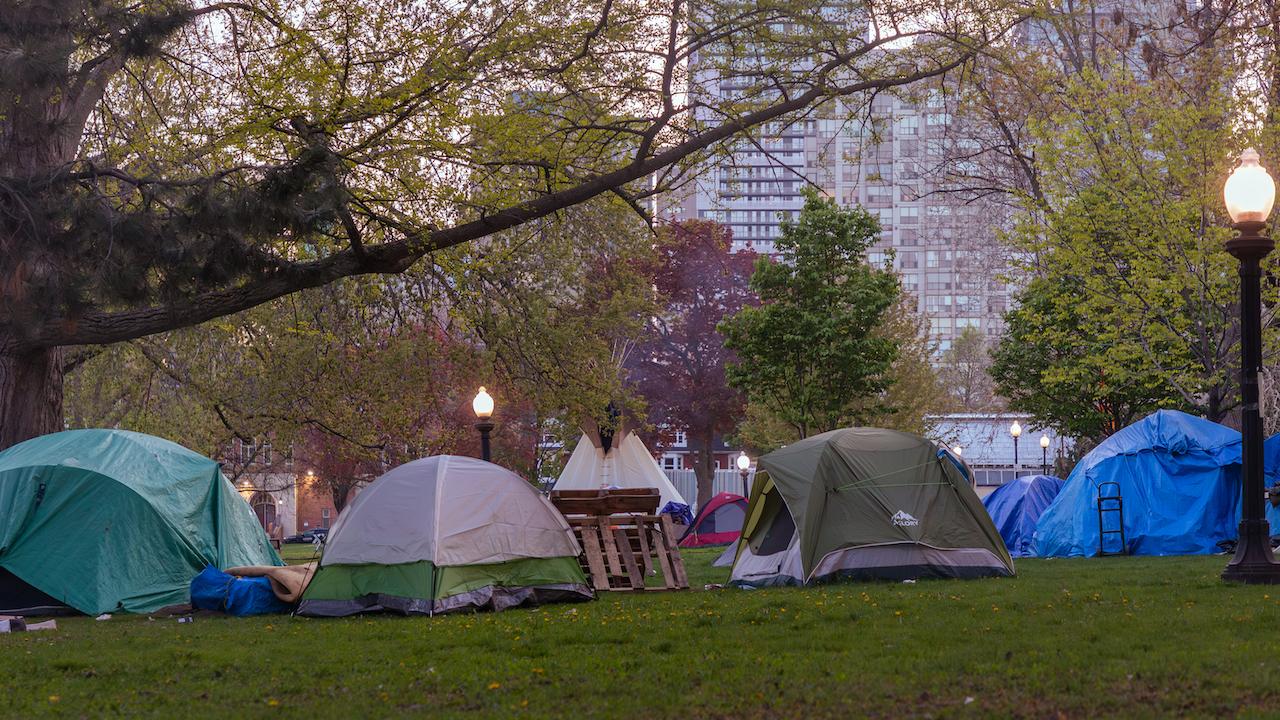In the lead-up to the June 26 mayoral by-election, the Toronto Region Board of Trade is calling on candidates to share plans on how they’ll take action on the key issues facing the city. This week, the board’s president and CEO Jan De Silva joins Daniele Zanotti, president and CEO of United Way Greater Toronto, to look at the factors driving homelessness and the growing threat to our city’s livability. Last week, the City of Toronto declared homelessness an emergency.
Read this article on tvo.org, and visit our Mayoral By-Election campaign to learn What's at Stake.
As of March, 10,811 people in Toronto were considered actively homeless — an increase of roughly 1,300 in the past year — a number that does not include those who are not using overnight-shelter services. And there are many who aren’t: 72 people on average were turned away from shelter every day in February.
For those monitoring the symptoms, this crisis has been swelling for decades in Canada’s largest city. Homelessness is the result of a combination of circumstances: poverty, a lack of affordable housing, and inadequate access to the right supports when and where they are needed.
Toronto’s housing market is the second-most expensive in Canada. Housing costs in the city have soared at rates far outpacing income levels, especially for those reliant on social-assistance rates well below the cost of living.
Research indicates that mental health in our population is declining as the cost of living increases. Community organizations that provide vital supports are struggling to keep pace with need, our shelter system is at capacity, and those who have fallen through the cracks are seeking shelter in places of last resort: in parks, on transit, in hospital emergency rooms.
Housing is a human right.
Homelessness is a crisis first and foremost for those experiencing it. For many, being unable to access safe, adequate housing means grappling with new or worsened mental- and physical-health challenges, barriers to employment, social stigma and isolation, and heightened risk of violence.
Homelessness is also a crisis for every Toronto resident, because it is symptomatic of trends that threaten our city’s livability for all. For example, Toronto is the epicentre of Canadian growth, and we expect to welcome up to 270,000 newcomers over the next two years. These newcomers are critical to addressing our ongoing labour shortages, but they will be unable to live, work, or thrive here if they cannot access affordable housing and appropriate settlement supports.
People do not live single-issue lives, and Toronto’s next mayor will not be expected to single-handedly address these structural issues. Nor could they: the challenges facing Toronto are interconnected and can be tackled only when partners across sectors and government leaders at all levels come together to implement the solutions we know make a difference.
We have already seen these possibilities in action. In Parkdale, the City of Toronto, University Health Network, and United Way Greater Toronto are delivering the Social Medicine Initiative, which will soon be home to 51 individuals with high health needs who are exiting homelessness. This initiative shows what can be achieved when partners with different pieces of the puzzle — like land, health supports, connection to community — work to address needs holistically.
In Scarborough, Destination Golden Mile, a pilot project — part of the UWGT-BMO Inclusive Local Economic Opportunity Initiative — is bringing together government, business, and community partners to leverage development taking place in the Greater Golden Mile. This initiative seeks to expand pathways to affordable housing and explore financing models to support other neighbourhoods.
Innovative solutions like these can be replicated and scaled across Toronto with a mayor committed to working in true partnership to tackle the pressures affecting a growing number of Torontonians. Doing so would include calling on the province to provide more support for affordable housing, social housing, income security, and robust mental-health, addictions, and social services — investments that reduce reliance on costly, provincially funded emergency services.It would also mean working with the federal government to ensure that newcomers have the services they need to settle and thrive in the city.
Toronto’s next mayor will be tasked with building a truly livable city. This will require concerted collaboration with all sectors and all levels of government, each taking action to bring about a city where all residents can experience home in meaningful, sustainable, lasting ways. Our shared success depends on it.
